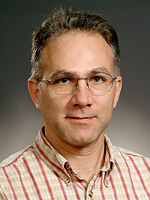Paul Gader, Ph.D.
Professor of Computer and Information Science and Engineering
College of Engineering
2012 Awardee
 Paul Gader studies Intelligent Systems, including new concepts for algorithms to process data measured by sensors “intelligently.”
Paul Gader studies Intelligent Systems, including new concepts for algorithms to process data measured by sensors “intelligently.” Gader seeks general methodologies for building computer programs requiring “intelligent” behavior (e.g. handwriting recognition). These programs can never work completely, as people make mistakes. Computers cannot solve such problems. It may take decades of research, or forever, to develop useful general methodologies.
His research ranges from purely mathematical to computational. It requires concepts from Algorithms, Artificial Intelligence, Neural Networks, Fuzzy Sets, Mathematics, Optimization, Probability/Statistics, and Image/Signal Processing. His research passion is to understand how to move from abstract theory to application.
Gader’s major research contribution in the last five years is devising general methodologies for landmine detection. He successfully blended a multi-disciplinary, multi-university team that went from abstract concepts to computer systems that save lives daily. Gader became a Fellow of the Institute of Electrical and Electronics Engineers (IEEE) as a result of that contribution. His research was crucial to developing two operational systems for finding landmines for humanitarian demining and in Afghanistan.
Although Gader’s landmine research is still active, he is moving into the area of hyperspectral imaging. He worked on research in this area and a textbook while on sabbatical at the Grenoble Institute of Technology in France. Hyperspectral imaging has important applications, including medical, environmental monitoring, food safety, military, and planetary exploration.

